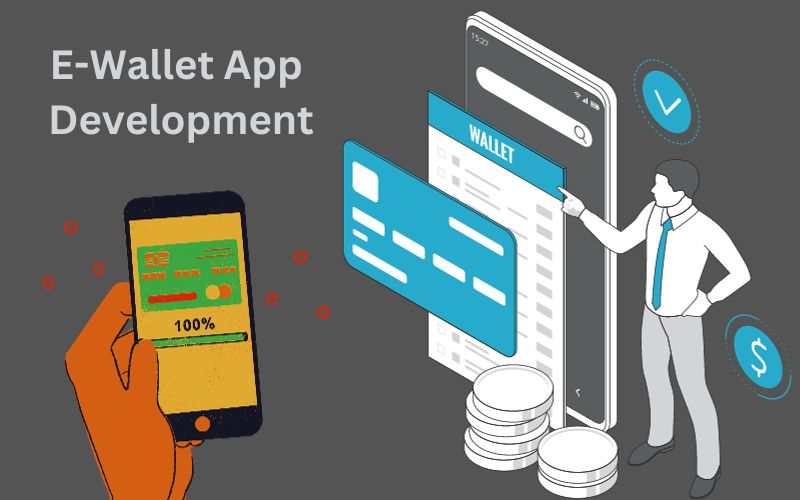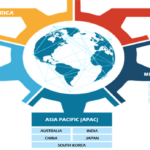Modern finance has undergone dramatic change over time, and today, digital transactions are on the rise, fueling an increased need for secure and efficient financial tools, such as digital wallet apps. This transition towards cashless economies has revolutionized our transaction methods while opening the way to greater convenience and accessibility.
This introduction provides an in-depth review of digital wallet app development, detailing its fundamental elements and critical success criteria that define successful eWallet app development solutions.
Digital wallet applications (also referred to as eWallets) have become an indispensable component of everyday life, providing users with a safe and seamless means to manage financial transactions. Businesses and consumers have increasingly adopted such applications as more companies focus on developing user-friendly eWallet solutions.
Digital wallet development entails many essential elements, from secure protocols and user interface design to payment method support and interoperability. Modern technologies like blockchain offer enhanced security, while artificial intelligence provides tailored user experiences to enhance eWallet app solutions.
The Essentials of Digital Wallet App Development
Digital wallet app development essentials, covering key features, security measures, and the ever-evolving landscape of this dynamic industry.
User-Friendly Interface
A crucial aspect of digital wallet app development is creating an accessible user experience, and one key ingredient of success for digital wallet apps is providing users with seamless and effortless experiences.
An effective user interface ensures that users can seamlessly navigate an app, conduct transactions efficiently, and access essential features without complications. Incorporating user-centric design principles enhances the overall user experience, making an app more appealing and valuable.
Multi-Platform Compatibility
To appeal to as broad an audience as possible, digital wallet apps must be developed on multiple platforms (i.e., iOS and Android). Ensuring compatibility across various devices and operating systems expands access and is more cost-effective in terms of development time – cross-platform development frameworks help streamline this process and can enable simultaneous releases on each platform.
Security Measures
Security is of utmost importance in e-wallet app development. Users entrust these applications with sensitive financial data that must remain protected against unintended access or fraudulent activities, so robust measures such as encryption protocols, secure authentication methods, and regular audits must be in place to bolster the app’s safety.
Biometric authentication – whether fingerprint or facial recognition – adds another level of protection, increasing overall data safety for user accounts.
Integration of Payment Gateways
A digital wallet app must integrate smoothly with various payment gateways to provide users with multiple payment methods – credit/debit cards, bank transfers, and mobile wallets are just some examples.
Integrating popular payment gateways will enable users to link their financial accounts directly with the digital wallet for seamless transactions, and keeping up with emerging payment technologies like contactless payments and cryptocurrency integration can increase its versatility and user base.
Transaction History and Receipts
Offering users easy-to-access transaction histories is crucial in creating trust. Digital wallet applications should maintain detailed records of users’ transactions to allow them to track past activities, monitor expenses, and reconcile finances more accurately.
Generating digital receipts for every transaction adds another level of ease and accountability, helping users maintain records of their financial activity.
Push Notifications
Push notifications can help users stay engaged by notifying them about successful transactions, account updates, security alerts, or promotional offers.
Customizable notification settings enable users to customize their experience, receiving relevant updates without feeling overloaded or stressed. Push notifications also facilitate increased user engagement while building trust among investors by informing them of real-time financial activities occurring around them.
QR Code Integration
QR code integration is an efficient feature to facilitate peer-to-peer transactions between individuals. Users can generate or scan QR codes to initiate or receive payments instantly – especially useful for in-store purchases, bill splitting, or fund transfers between friends.
With their convenience and speedy payment capabilities, QR codes contribute significantly towards increasing the efficiency and user-friendliness of your digital wallet app.
Compliance Standards and Limits:
Digital wallet app development involves adhering to regulations that ensure safety, legality, and the legality of transactions. As with other industries, compliance requirements vary significantly between digital wallet app platforms; financial industry-related transactions fall under specific governing bodies that must meet various compliance standards to remain within regulatory boundaries and be legal and safe.
Developers must stay abreast of local, national, and international financial regulations and implement compliance measures to operate legally and safely. They also require certifications to be lawfully used.
Customer Support
Establishing an effective customer support system is paramount in promptly responding to user concerns and issues. A responsive team available via various channels such as chat, email, or phone builds trust among users while quickly solving problems, answering inquiries, or providing assistance can contribute to an enjoyable user experience. Creating this environment will increase user loyalty as they feel taken care of promptly by you!
Scalability and Future-Proofing
Digital wallet apps must be designed with scalability in mind to accommodate potential growth in user numbers and transaction volume while future-proofing the app means anticipating technological advancements, innovative payment options, and changing customer preferences.
Tips to Hire e-Wallet App Developers
Here are a few essential guidelines that will assist to hire e-Wallet app developers who will bring your vision to fruition.
Define Your Project Requirements
Before beginning the hiring process, it’s essential that you clearly outline your project requirements. Detail what features and functionalities you require from an e-wallet app: peer-to-peer transactions, QR code scanning, or integration with existing financial systems – having an outline will enable you to hire developers with appropriate expertise.
Consider Relevant Experience
When seeking out developers of e-wallet apps, prioritize candidates who possess significant mobile app development experience within the fintech sector – specifically security protocols, payment gateways, and compliance standards.
During your search for developers of these projects, make sure their portfolio demonstrates previous work developing similar projects, as this will indicate what kind of experience is essential when hiring the ideal candidate for you.
Technical Prowess
E-Wallet app development demands proficiency with various technologies, from mobile app frameworks and programming languages to security protocols. Search for developers adept in Java, Kotlin, Swift, or React Native, depending on your platform (iOS or Android), with knowledge of secure coding practices and encryption protocols essential to protecting financial transactions.
Check Reviews and References
Before finalizing your decision, conduct extensive research on any developers or development firms you are considering. Gather reviews, testimonials, and case studies, as well as reach out to their previous clients if possible to gain more insights into their working style, communication abilities, and overall client satisfaction levels – this step will give a much clearer idea of what awaits when working with their chosen developer(s).
Assess Problem-Solving Skills
E-wallet app development poses numerous complex challenges regarding security and user experience, so during your interview process, assess candidates’ problem-solving abilities by creating hypothetical security breaches or transaction failure scenarios and seeing how developers respond or solve these issues.
Emphasize Security Expertise
Security should always come first when handling financial transactions, so when hiring developers, they possess expert knowledge regarding security protocols, encryption methods, and PCI DSS (Payment Card Industry Data Security Standard). Having this expertise ensures sensitive user data remains protected while simultaneously building user trust within your app users.
Effective Communications | To Ensure Project Success
Clear communication skills are integral for the success of any development project, so select developers with exceptional ability to articulate technical concepts clearly so non-technical stakeholders can understand.
Invest in finding developers able to explain technological ideas so non-technical stakeholders understand them, thus helping avoid miscommunication, meet project requirements on time, and foster a collaborative working environment.
Consider Cultural Fit
Alongside technical abilities, consider whether developers will mesh well with your organization. A team that shares its values and culture is more likely to collaborate effectively and produce successful outcomes; make sure during interviews that you assess candidates based on compatibility with team culture and organizational culture.
Budget Considerations
Although quality should always precede budget considerations, budget should also be discussed before working with developers or development firms on any projects. Ensure all aspects of finance related to your project have been clearly explained to prevent surprises later.
Continuous Learning and Adaptability
The technology landscape is ever-evolving; new developments appear regularly. To stay abreast of results in e-wallet app development, choose developers dedicated to learning recent trends and technologies relevant to developing an app; this ensures your app remains relevant and competitive within an ever-evolving marketplace.
Conclusion
Digital wallet application development is an ever-evolving field that continually alters our relationship to financial transactions. Digital wallet development has become even more indispensable in today’s fast-paced digital economy.
With cashless transactions becoming regular and financial interactions becoming seamless, eWallet app development services have taken on greater significance for providing safe, efficient, and user-friendly solutions.
Utilizing cutting-edge technologies, strong security measures, and user-centric design principles should be emphasized during development processes. Given smartphones and their growing ubiquity across platforms like Android and iOS phones, digital wallets have emerged as integral elements in financial technology innovation.
EWallet apps have completely revolutionized how individuals manage their finances, from contactless payments and loyalty programs to digital ID and digital identification.
Companies and consumers are beginning to recognize the convenience and efficiency offered by digital wallets, spurring demand for innovative eWallet app development services. Developers must remain up-to-date with market trends, user preferences, and security standards to stay ahead of competitors in this competitive landscape.





